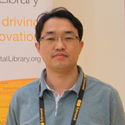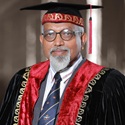Keynote Speakers

Prof. Shyi-Ming
Chen
Asia University, Taiwan
IEEE Fellow, IET Fellow, IFSA Fellow, AAIA Fellow, IETI Distinguished Fellow
Member of the National Academy of Artificial Intelligence (NAAI)
Fellow of the Pakistan Academy of Engineering (PAE)
Short Bio: Shyi-Ming Chen is a Chair Professor in the Department of Computer Science and Information Engineering, Asia University, Taichung, Taiwan. He received the Ph.D. degree in Electrical Engineering from National Taiwan University, Taipei, Taiwan, in June 1991. He is an IEEE Fellow, an IET Fellow, an IFSA Fellow, an AAIA Fellow, an IETI Distinguished Fellow, a Member of the National Academy of Artificial Intelligence (NAAI), and a Fellow of the Pakistan Academy of Engineering (PAE). He was a Chair Professor in the Department of Computer Science and Information Engineering, National Taiwan University of Science and Technology, Taipei, Taiwan. He was the Dean of the College of Electrical Engineering and Computer Science, Jinwen University of Science and Technology, New Taipei City, Taiwan. He was the Vice President of the National Taichung University of Education, Taichung, Taiwan. He was the President of the Taiwanese Association for Artificial Intelligence (TAAI). He was the President of the Taiwanese Association for Consumer Electronics (TACE). He has published more than 600 papers in referred journals, conference proceedings and book chapters. His research interests include Fuzzy Systems, Intelligent Systems, Fuzzy Decision Making, Computational Intelligence, Knowledge-Based Systems, Machine Learning, Data Mining, Big Data Analysis, Genetic Algorithms, and Particle Swam Optimization Techniques. He is an Associate Editor of IEEE Transactions on Fuzzy Systems, an Associate Editor of IEEE Transactions on Cybernetics (2019-2024), an Associate Editor of the IEEE Transactions on Systems, Man, and Cybernetics: Systems, an Associate Editor of IEEE Transactions on Artificial Intelligence, an Associate Editor of Knowledge-Based Systems, an Associate Editor of Expert Systems with Applications, an Editorial Board Member of Information Fusion, an Associate Editor of International Journal on Artificial Intelligence Tools, an Associate Editor of International Journal of Pattern Recognition and Artificial Intelligence, an Associate Editor of International Journal of Fuzzy Systems (2003-2024), an Associate Editor of Journal of Information Science and Engineering, an Associate Editor of Fuzzy Optimization and Decision Making (2016-2024), an Associate Editor of Knowledge and Information Systems (2016-2025), an Editor of International Journal of Intelligent Systems, an Editor of Engineering Applications of Artificial Intelligence (2022-2025), an Editor of Applied Computational Intelligence and Soft Computing, and an Associate Editor of International Journal of Computational Intelligence and Applications.

Prof. Chinthaka
Premachandra
Shibaura Institute of Technology, Japan
Speech Title: AI-Powered Image and Video Technologies for Effective Post-Disaster Operations
Short Bio: Chinthaka Premachandra (Senior Member, IEEE) was born in Sri
Lanka. He received the B.Sc. and M.Sc. degrees from Mie University, Tsu, Japan, in 2006
and 2008, respectively, and the Ph.D. degree from Nagoya University, Nagoya, Japan, in
2011. From 2012 to 2015, he was an Assistant Professor with the Department of Electrical
Engineering, Faculty of Engineering, Tokyo University of Science, Tokyo, Japan. From
2016 to 2017, he was an Assistant Professor with the Department of Electronic
Engineering, School of Engineering, Shibaura Institute of Technology, Tokyo, where he
was an Associate Professor, from 2018 to 2022. In 2022, he was promoted to a Professor
with the Department of Advance Electronic Engineering, Schoolof Engineering and Graduate
School of Engineering, Shibaura Institute of Technology, where he is currently the
Director of the Image Processing and Robotic Laboratory. His research interests include
AI, UAV, image processing, audio processing, intelligent transport systems (ITS), and
mobile robotics.
He is a member of IEEE, IEICE, Japan; SICE, Japan; RSJ, Japan; and SOFT, Japan. He has
received many awards, including the IEEE SENSORS LETTERS Best Paper Award from the IEEE
Sensors Council in 2022 and the IEEE Japan Medal from the IEEE Tokyo Section in 2022. He
also received the FIT Best Paper Award and the FIT Young Researchers Award from IEICE
and IPSJ, Japan, in 2009 and 2010, respectively. He has served as a steering committee
member and an editor for many international conferences and journals. He is the Founding
Chair of the International Conference on Image Processing and Robotics (ICIPRoB), which
is technically co-sponsored by IEEE. He is currently serving as an Associate Editor for
IEEE Robotics and Automation Letters (R-AL) and Guest Editor for IEEE Sensors
Journal.

Prof. Seokwon
Yeom
Daegu University Gyeongsan, South Korea
Short Bio: Seokwon Yeom has been a faculty member of Daegu University
since
2007. He has a Ph.D. in Electrical and Computer Engineering from the University of
Connecticut in 2006.
He has been a guest editor of Drones and Applied Sciences in MDPI since 2019. He has
served
as a board member of the Korean Institute of Intelligent Systems since 2016, and a
member of
the board of directors of the Korean Institute of Convergence Signal Processing since
2014.
He has been program chair of several international conferences. He was a vice director
of
the AI homecare center and a head of the department of IT convergence engineering at
Daegu
University in 2020-2023, a visiting scholar at the University of Maryland in 2014, and a
director of the Gyeongbuk techno-park specialization center in 2013. He has been a
keynote
or invited speaker at several international conferences. His research interests are
intelligent image and optical information processing, deep and machine learning, target
tracking, and drone localization.

Assoc. Prof. Dr. Afizan Azman
Taylor's University, Selangor, Malaysia
Short Bio: Afizan Bin Azman received a Ph.D. degree from Lough borough University, U.K. He is an Associate Professor at the Department of Computer Science and Engineering at Taylor's University, Subang Jaya, Selangor, Malaysia, and the Director of the lmpact Laboratory, Digital innovation and Smart Society. His research primarily focuses on image processing, machine learning, and data analytics, with a strong emphasis on advancing academic research and practical applications in digital innovation and developing a smart society.

Prof. Ravindra Lal Weeraratne Koggalage
General Sir John Kotelawala Defence University, Sri Lanka
Short Bio: Professor Ravindra Lal Weeraratne Koggalage, a distinguished scholar and academic of the Faculty of Computing at the General Sir John Kotelawala Defence University. Professor Koggalage has a truly unique academic journey, holding two doctoral degrees, a Ph.D. in Engineering from the University of Melbourne, specializing in Artificial Intelligence, Image Processing, Data Mining, Pattern Recognition, Clustering, and Classification, and a second Ph.D. in Buddhist Studies from Mahachulalongkornrajavidyalaya University in Thailand.
In addition, he is a Project Management Professional (PMP) certified in the USA, and has earned an M.Eng. in Information Systems Research from Nanyang Technological University, Singapore, as well as an M.Sc. in Electrical Engineering with a focus on computing from the National University of Singapore. His academic foundation was laid with a B.Sc. (Hons) in Computer Science and Engineering from the University of Moratuwa, Sri Lanka.
Professor Koggalage’s research expertise is both wide-ranging and impactful. His work focuses on Artificial Intelligence, Machine Learning, Advanced Image Processing, Neural Networks, Multimedia Networking, and Distributed Systems, while also delving into Real-Time Systems, Multiprocessor Systems, and the Business of Electronic Product Development. He has published and supervised extensively in these fields, contributing to the advancement of knowledge and innovation in computing and engineering.
Professor Koggalage is exceptional in his ability to bridge cutting-edge technology with broader philosophical and humanistic perspectives. This combination allows him to bring unique insights into how technology and human values can align to create meaningful impact on society.